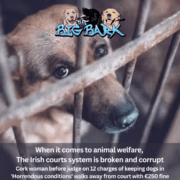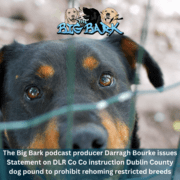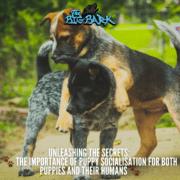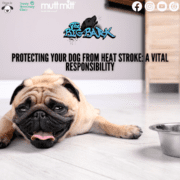When it comes to animal welfare, The Irish courts system is broken and corrupt
Cork Woman convicted of 12 animal cruelty charges banned from owning animals walks away with minimal €250 fine
One has to question what in the absolute hell is wrong with the judiciary in this country? Does the Irish government not give a damn about Animal Welfare? Our judges certainly do not and this has been evidenced time and time again and most recently in Bandon District court this week, where a cork woman convicted of 12 counts of animal cruelty, received a 250 euro fine. A €250 fine? What an absolute utter joke!
The judges on these benches could wipe their arse with €250, it means that little to them. Is it a case in this absolute corrupt system of justice, that pleading guilty, gets you off the hook?
Case Background:
So, let’s give some context on this here: Miriam Santry of The Meadows, Belgooly, Co Cork was banned from owning animals and ordered to surrender any animals in her possession to the ISPCA after being guilty on kept over than a dozen dogs of various breeds in “Horrendous conditions” over an extended period. Ms Santry appeared before Bandon District Court facing a total of 12 summonses for alleged offences under the Animal Health and Welfare Act 2013. Santry pleaded guilty to the charges in front of Judge Philip O’Leary.
In evidence, ISPCA Inspector Caroline Faherty said, she had first received complaints regarding the defendent in September 2022. The complaints were in relatio to the conditions dogs were being kept in at two properties, one in Belgooly and the other in Kinsale.
Insp. Faherty told the court that she went to both properties on several occasions but was unable to make contact with Santry. The house in Belgooly she could see the house was full of rubbish and several dogs could be heard barking. On September 21, 2022 Inspector Faherty received a letter from a solicitor representing Santry asking her not to call to her properties anymore.
In October 2022, The ISPCA was alerted to further animal cruelty breaches by Santry after she brought a dog with a broken pelvis to the local vet. Santry told the vet that she had tried to mate the seven-month-old poodle with a bigger dog but refused the vet’s advice on treatment and asked for painkillers for the injured dog.
A search warrant to search both properties was executed on December 22, 2022 by Insp. Faherty executed a warrant to search both properties. She told the court that she gained access to the Belgooly property via the back garden and nobody was present when she arrived with gardaí. Inside she found eight adult dogs in deplorable conditions jammed into a small crate which had a capacity for 2 dogs maximum. She said that the property was filled with rubbish and the smell was so rancid that the gardaí were unable to come inside. Insp. Faherty told the court that a further five puppies were also found in two crates. No food or water available to any of the dogs and they were in very poor condition.. No natural light was possible as the windows were blacked out and there was faeces and urine over the floor. The dogs were malnourished and their coats were matted with urine and faeces. The dogs also variously suffered multiple infections, including Demartitis, ear and eye infections and a number of dogs had heart murmurs. Upon inspection of the address in Kinsale, three further dogs were found in similar conditions.
Insp. Faherty said a decision was taken to seize the dogs and attempt to rehome them as they were subject to long term neglect The court heard that four of the dogs, which were chipped with Santry’s details could not be rehomed as Santry refused to surrender the animals to the ISPCA. As a result, they had been kept in boarding kennels since being seized resulting in a cost to the ISPCA of €56,000.
Mental health issues
Defence solicitor Plunkett Taaffe said that his client, who was now in her 50s, had recently suffered from mental health issues. He said that the situation had “got out of control” and his client acknowledged that she had taken on too many dogs. He said she was of “limited means and was struggling financially and mentally”.
State solicitor for West Cork, Jeremiah Healy, who took the prosecution on behalf of the Minster for Agriculture, Food, and the Marine said that State felt it was necessary to prosecute given the circumstances and extend of animal cruelty involved.
Conviction
Judge Philip O’Leary said that it was clear from the evidence there had been an appalling treatment of animals over a considerable period of time, he said it was an appalling case. On the first summons he convicted and fined Miriam Santry €250 and took the other 11 charges into consideration. He prohibited her from owning any animals and ordered her to surrender any animals she currently owns to the ISPCA.
Call for overhaul of animal welfare legislation and the courts system in Ireland:
This case is a prime example of why we need a complete overhaul in Ireland of animal welfare regulations and why we need animal welfare officers in every Garda division throughout Ireland. For too long, disgusting and cruel people like Miriam Santry have been allowed to treat these beautiful dogs with such cruelty and walk away without significant punishment. While Santry is prohibited from owning any animals and must surrender all animals she owns to the ISPCA, she walked away with one single conviction – on the first summons. Of the remaining 11 charges, Judge Philip O Leary, took these charges into consideration, Santry did not receive any fines or convictions for these remaining 11 charges.
I’ll speak freely and ask here what the absolute fuck is wrong with the judiciary in this country? If this was Italy, Sweden, Japan, Tanazania, Austria, or Kenya, all of whom have a stellar record for protecting animals, this woman would be in prison. She would have incurred the boarding kennelcosts that are instead inflicted on the ISPCA, she would have incurred legal costs. Instead, while she may be no longer permitted to keep animals, she walks away with a €250 fine. She pled guilty to all 12 charges, and she still walks away pretty much scot free and all because she pled guilty in a country where we have a broken system where saying “Oh Yes I did commit those unspeakable acts” is actually rewarded.
We’ve seen it in so many high profile cases lately in terms of humans, where humans plead guilty to assault and other serious crimes are given suspended sentences because of either who they are, who they know or what they do. Quite often, they have “glowing character references” from people in very influential positions and our judges take pity on them. A criminal is still a criminal and a scumbag – it doesn’t matter what character references you have and it doesn’t matter if you’re an army officer or an all star Limerick hurler. If you assault another person, if you beat up someone in a nightclub, if you beat up a defenseless woman on the streets, sorry but there is no excuse for that, you’re a total scumbag and you belong in prison – you don’t deserve to get a suspended sentence and walk free from court.
Equally, if you treat a dog, or a horse or a cat or any other animal with the same regard, if you treat them in such a fashion that their hair is matted in their own faeces, you’re a scumbag. Many of us have mental health issues, we don’t take it out on our animals. In fact its our dogs and our animals that more often than not help us through these times of mental anguish.
The problem in Ireland is not just in the courts, It’s the entire system, it’s how we allow our animals to be treated – The system stinks the whole way up to the ministers who have responsibility for animal regulations – the ministers for agriculture and rural and community development. In 95% of animal welfare cases, The judges are too lenient, the defence solicitors only give a crap about their paycheck and have zero concern about the harm being done to our beloved animals and the bottom line is other than the hard working staff and animal welfare inspectors in societies like the DSPCA, and the dedicated volunteers in so many rescues throughout Ireland, nobody in a position of power that can do something to influence change actually gives a shit about animal welfare in this country.
The Big Bark producer Blasts Dun Laoghaire Rathdown County Council over unlawful policy change re: restricted dogs
[Limerick Ireland, 12/07/2024] The Big Bark owner & producer Blasts Dun Laoghaire Rathdown County Council over unlawful policy change re: restricted dogs
- The Big Bark producer blasts Dun Laoghaire Rathdown county council for unlawful policy change on restricted breeds
- DLR policy change prohibits rehoming of restricted breed dogs from Dublin County Dog shelter
- DLR advise the pound operator that all restricted breeds entering the pound from the DLR area are deemed unsuitable for rehoming.
- DLR respond stating that decision made due to XL bully attack in Limerick in May
- Local Councillors unaware of policy change according to Councillor Hugh Lewis
- Call for chief executive of DLR Frank Curran to investigate and reverse policy decision immediately
- The Big Bark calls for civil servant responsible for this policy change to be removed from any position of responsibility for animal welfare policies
Earlier today, I was made aware of the appalling decision by Dun Laoghaire Rathdown County Council to implement a policy change for Dublin County Dog Shelter, instructing the shelter that they were prohibited from rehoming Dogs which are featured on the restricted breeds list.
While there has been some level of expectation for quite some time that Ireland would follow in the footsteps of the UK in regards to an XL Bully ban (of which we do not approve), this policy change by DLR has left us at The Big Bark shocked, appalled and absolutely furious.
Upon being made aware of this policy change, we immediately contacted DLR for comment and clarification in which they confirmed the instruction was made following the recent XL Bully attack in Limerick, which by now we are all aware of. Their justification for euthanizing every restricted breed dog that is not claimed by an owner in the space of 5 days is a dog attack that happened 130 miles from their location, a dog attack that involved one breed of dog – an XL Bully.
They are using this as justification to euthanize any restricted breed dog that they wish, without consulting with rescues, dog owners, the brilliant staff who work so hard at the pound and as it so happens, they didn’t even consult the councillors who sit on DLR council. Hugh Lewis Councillor with DLR confirmed in a statement on his facebook page today that councillors were not informed of this policy shift.
We asked DLR what bye laws or what statutes were introduced into legislation that allowed such a policy shift and they have failed to provide an answer. Our own research has indicated that this policy change is completely unlawful. DLR council failed to answer this but provided the following unacceptable statement to The Big Bark.
‘DLR took the decision following the recent horrific attack in Limerick. DLR advised the pound operator that all restricted breeds entering the pound from the DLR area are deemed unsuitable for rehoming. As the restricted breeds are deemed unfit for rehoming, this left no option but to have the dogs put to sleep. Following Minister Heather Humphreys announcement on XL bully dogs this morning, DLR will review the position on the inclusion of all restricted breeds. One XL Bully dog has been put to sleep.
The pound has been advised that no further dogs are to be put to sleep until this review takes place. Until the review takes place, we are not in a position to partake in a debate.’
While we do welcome their decision to not put any further dogs to sleep until a review takes place, the initial policy change is unwarranted and unlawful. I put the question to DLR regarding what was the legal basis for this initial policy change? No provisions in any bye-laws or legislative statute exist that allow for such a policy shift from the current Control of Dogs Act which in its current form no way prohibits the rehoming of restricted breeds from pounds or shelters. In a statement to a Dublin based rescue, DLR confirmed that the policy of non-rehoming and euthanising of restricted breed dogs not claimed by their owner within 5 days would “continue until the report by the working group on control of dogs is published”.
The staff at Dublin dog pound are to be commended for the tireless efforts and incredible work they have being undertaking since taking over services from the now defunct Ashton pound. Nobody has forgotten the barbaric cruelty that occurred in Ashton Pound. With this one policy change from DLR, this will undo all the hard efforts of the staff at Dublin Dog pound with a policy that utilises tactics previously attempted within Ashton pound. In 2o24, we have civil servants implementing these barbaric policies and instructing that dogs whose only crime is to wander out of their own homes be put to sleep. The danger here is that this will give way to other councils to attempt to follow suit and unqualified civil servant
At the Big Bark, we are calling on DLR to immediately and permanently reverse this policy change which in its current form is an immensely unlawful policy. The very fact that councillors, rescues and the staff at the pound were not consulted about this implies that the instruction came from civil servants with no authority to issue such an instruction.
We are also calling on Dun-Laoghaire Rathdown county council to immediately and permanently reverse this despicable policy change, and moving forward adhere to the legislation set out in the control of dogs act, in addition to local bye laws and other statutes and to remove the individual responsible for issuing this so called instruction to Dublin pound from their post of responsibility.
We wish to be clear, any individual(s) who can issue such a barbaric and appalling instruction without authority does not deserve to hold a position of responsibility and should not be making any decisions about animal welfare at all or implementing any policies regarding animal welfare with or without the correct authority to do so.
While this policy was implemented by a civil servant, we are calling on the Chief executive of Dun Laoghaire Rathdown county council to ensure this policy change is immediately reversed and that restricted breed dogs will be permitted to be rehomed from Dublin pound, unless government legislation via statute or local bye-law otherwise dictates. Until such time as such legislation is implemented, we would like to remind Mr Curran and his team of DLRs obligations and responsibilities to the welfare of animals in their via any pound or shelter under their jurisdiction and that in caring for these beautiful animals, they ensure that this is being done in line with legislation currently in effect and that civil servants in Mr Curran’s employ are not implementing any policy changes regarding the control of dogs or other animal welfare issues without first consulting with the correct authorities and determining if they have the legal precedent to even make such a policy shift.
In his role of Chief executive Mr Curran is ultimately responsible for the decisions that are made by civil servants in Dun Laoghaire Rathdown county council and we at The Big Bark along with all animal advocates across Ireland are holding him accountable for the actions of this civil servant who implemented this unlawful policy change and moving forward ensuring him and his team in DLR uphold the current animal welfare legislation in effect in the DLR jurisdiction and attempt to make no further similar unwarranted changes moving forward.
For more information – email [email protected] or phone 085-1094903
Dealz ordered to pay €7,000 after challenging Irish Paralympian over guide dog in store
Irish discount retailer Dealz has been ordered to pay €7,000 compensation to a blind Irish Paralympian who was challenged at its Ilac Centre outlet last year for bringing her guide dog into the store.
Nadine Lattimore, a blind paralympian who competed for Ireland at the 2012 paralympic games in London told the WRC that she was humiliated by security personnel in Dealz after she was called out for bringing her guide dog, Pilot, into the shop, which drew attention to her disability.
Ms Lattimore said she had gone to the Dealz store at around 9.30am to purchase helium balloons for an event later that day The WRC heard she was familiar with the shop and the staff, some of whom who had been helpful in the past.
Ms Lattimore said she became aware of voices or a commotion behind her as she was making her way carefully to the cash register to look for assistance.Although she did not think it was anything to do with her, a security guard approached her and said: “Excuse me. That dog is not allowed in here.” Ms Lattimore said she felt humiliated and asked to speak with the manager.
The WRC heard the manager arrived immediately and confirmed the dog was welcome in the store and the mistake should never have happened. He explained the issue had arisen from the rotation of security guards. In her testimony to the WRC, Ms Lattimore acknowledged an apology had been made, including one from the security guard. However, she expressed concern that the situation had arisen at all. Ms Lattimore said she should not have been put in a position of having to identify or explain her disability.
In her decision, Workplace Relations Commission Adjudication Officer Penelope McGrath said in this case, there is no ambiguity. This is evidenced by the presence of a guide dog with all the associated paraphernalia. The Complainant painted a vivid image of how difficult standing her ground was. She had no sense of how many people were watching this interaction which took place in a public place.
Ms Lattimore explained that when she is out and about with Pilot it is clear that he is a guide dog. The Complainant showed me the reflective harness and vest together with the rigid handle frame. The dog also has a flash notice together with the medallion identifying the dog as a guide dog. I am satisfied that even the most cursory of glances would immediately identify Pilot as a working dog.
Ms Mcgrath ruled that Ms Lattimore had established a prima facie case of discrimination contrary to the Equal Status Act and had been made to feel “other”.
Awarding compensation of €7,000 to Ms Lattimore, Ms McGrath also directed that all Dealz staff be trained on a repeat basis on the provisions of the Equal Status Act and the associated duties of service providers. She also directed that signs stating guide dogs and assistance dogs are welcome should be displayed at entrances to their stores.
In a statement following the ruling, a spokesperson for the retailers said: “The tribunal confirmed that the individual involved was a security contractor, not a Dealz colleague, and that our store manager immediately stepped in to try and put matters right. “Nevertheless, we apologise again to Nadine for what happened at our Ilac Centre store last year. “It goes without saying service animals are, and always will be, welcome in all our stores, and we’re pleased to have the opportunity to make that clear.”
🐾 The Importance of Puppy Socialisation for Both Puppies and Their Humans 🐾
🐾 The Importance of Puppy Socialisation for Both Puppies and Their Humans 🐾
Puppy socialisation is a crucial aspect of raising a well-behaved, confident, and happy dog. It involves exposing puppies to a variety of people, environments, sounds, and other animals during their critical development period, typically between 3 and 14 weeks of age. Let’s delve into why socialisation is so important and what the research says about its benefits and the consequences of neglecting it.
Why Socialisation is Crucial
1. Behavioral Development: Socialisation helps puppies learn how to interact appropriately with their environment. According to a study published in the Journal of Veterinary Behavior, early socialisation reduces the likelihood of behavioral problems such as aggression and fearfulness in adult dogs (Duxbury et al., 2003).
2. Stress Reduction: Well-socialised puppies are less likely to develop anxiety disorders. They learn to handle stress and unfamiliar situations with greater ease. Research by Scott and Fuller (1965) highlights that puppies exposed to varied environments and stimuli during their early weeks show lower stress responses as adults.
3. Bonding and Trust: Socialisation strengthens the bond between puppies and their humans. By exposing your puppy to different experiences together, you build trust and establish a strong, positive relationship. A well-socialised puppy is more likely to see their human as a source of safety and guidance.
4. Adaptability: Puppies that are properly socialised are more adaptable to changes and new environments. This is particularly important for families who travel or move frequently. According to the Journal of Applied Animal Welfare Science, dogs exposed to diverse environments during their socialisation period adapt better to new situations throughout their lives (Serpell & Jagoe, 1995).
Consequences of Poor Socialisation
1. Behavioral Issues: Puppies that are not adequately socialised may develop fear-based aggression or excessive shyness. The Journal of the American Veterinary Medical Association reports that dogs with inadequate socialisation are more likely to be relinquished to shelters due to behavioral issues (Salman et al., 2000).
2. Anxiety and Phobias: Lack of socialisation can lead to chronic anxiety and specific phobias (e.g., fear of loud noises, strangers, or other animals). A study in the Journal of Veterinary Behavior found that dogs not exposed to various stimuli in their early weeks are more prone to anxiety disorders (Appleby et al., 2002).
3. Health Risks: Unsocialised dogs may be more challenging to handle during veterinary visits, leading to stress for both the dog and the owner. This can result in owners avoiding necessary vet visits, potentially leading to overlooked health issues.
4. Decreased Quality of Life: Dogs that are fearful or aggressive often have a reduced quality of life. They might be confined more often or miss out on activities that enhance their well-being. Proper socialisation ensures dogs can enjoy a wide range of experiences without undue stress.
Tips for Successful Socialisation
1. Start Early: Begin socialisation as soon as your puppy is home and has received the necessary vaccinations.
2. Positive Reinforcement: Use treats and praise to create positive associations with new experiences.
3. Variety: Expose your puppy to different people, animals, environments, and sounds.
4. Controlled Environment: Ensure initial interactions are in a controlled, safe environment to prevent overwhelming your puppy.
5. Puppy Classes: Enroll in puppy socialisation classes where your puppy can interact with other dogs under professional supervision.
Conclusion
Socialising your puppy is an investment in their future well-being and happiness. It leads to a more confident, well-adjusted dog and a stronger bond between you and your furry friend. Remember, the effort you put into socialising your puppy will pay off in countless ways as they grow into a happy and well-behaved adult dog.
—
References:
– Duxbury, M. M., Jackson, J. A., Line, S. W., & Anderson, R. K. (2003). Evaluation of association between retention in the home and attendance at puppy socialization classes. Journal of the American Veterinary Medical Association, 223(1), 61-66.
– Scott, J. P., & Fuller, J. L. (1965). Genetics and the Social Behavior of the Dog. University of Chicago Press.
– Serpell, J., & Jagoe, J. A. (1995). Early experience and the development of behavior. In J. Serpell (Ed.), The Domestic Dog: Its Evolution, Behaviour and Interactions with People. Cambridge University Press.
– Salman, M. D., New, J. G., Scarlett, J. M., Kass, P. H., Ruch-Gallie, R., & Hetts, S. (2000). Human and animal factors related to the relinquishment of dogs and cats in 12 selected animal shelters in the United States. Journal of Applied Animal Welfare Science, 3(2), 93-106.
– Appleby, D. L., Bradshaw, J. W., & Casey, R. A. (2002). Relationship between aggressive and avoidance behaviour by dogs and their experience in the first six months of life. Veterinary Record, 150(14), 434-438.
Protecting Your Dog from Heat Stroke: A Vital Responsibility
As temperatures soar over the summer months, it’s essential for dog owners to understand the dangers of heat stroke and take necessary precautions to protect their furry friends. Heat stroke in dogs can lead to severe health issues and even be fatal if not promptly addressed. This blog post delves into the importance of safeguarding your dog from heat stroke, supported by insights from renowned research papers.
Understanding Heat Stroke in Dogs
Heat stroke occurs when a dog’s body temperature rises to dangerous levels, typically above 104°F (40°C). Unlike humans, dogs cannot sweat through their skin; they primarily regulate their body temperature through panting and, to a lesser extent, sweating through their paw pads. When these mechanisms are overwhelmed, heat stroke can set in.
The Severity of Heat Stroke: Insights from Research
A study published in the *Journal of Veterinary Emergency and Critical Care* highlights the critical nature of heat stroke in dogs. The research indicates that “heat-related illness in dogs is associated with high morbidity and mortality rates, particularly when treatment is delayed or inadequate” (Bruchim et al., 2006). This underscores the need for immediate action and preventive measures.
Symptoms of Heat Stroke in Dogs
Recognizing the signs of heat stroke early can make a significant difference in outcomes. Common symptoms include:
- Excessive panting and drooling
- Red or pale gums
- Rapid heart rate
- Vomiting and diarrhea
- Lethargy or confusion
- Seizures
If you observe any of these signs, it’s crucial to act quickly to cool your dog and seek veterinary care.
Preventive Measures
1. Limit Exercise During Peak Heat: Avoid vigorous exercise during the hottest parts of the day. Instead, opt for early morning or late evening walks when temperatures are cooler.
2. Provide Ample Water and Shade: Ensure your dog has constant access to fresh water and a shaded area to rest. This is especially important for dogs kept outside.
3. Never Leave Your Dog in a Hot Car: Cars can become dangerously hot in a matter of minutes, even with windows cracked. The interior temperature can rise rapidly, leading to fatal heat stroke.
4. Be Mindful of Humidity: High humidity can make it harder for dogs to cool themselves through panting. On humid days, take extra precautions and reduce outdoor activities.
Special Considerations for Different Breeds
Certain breeds are more susceptible to heat stroke due to their physical characteristics. Brachycephalic breeds, such as Bulldogs and Pugs, have shorter snouts, which can impair their ability to pant effectively. Research published in *PLOS ONE* indicates that “brachycephalic dogs are at a significantly higher risk of heat-related illness compared to non-brachycephalic breeds” (Hall et al., 2020). Additionally, older dogs, overweight dogs, and those with preexisting health conditions are at greater risk.
Emergency Response
If you suspect your dog is suffering from heat stroke, take immediate action:
– Move your dog to a cooler environment.
– Offer small amounts of cool (not cold) water.
– Wet your dog with cool water, particularly on the belly, armpits, and paw pads.
– Seek veterinary care immediately, as professional intervention can be life-saving.
Protecting your dog from heat stroke is a critical aspect of responsible pet ownership. By understanding the risks and taking proactive steps, you can ensure your furry friend stays safe and healthy during hot weather. Remember, prevention is the best cure, and your vigilance can make all the difference. If you think your dog is showing symptoms of heat stroke, don’t wait, contact your nearest veterinary hospital immediately.
References
Bruchim, Y., Kelmer, E., Cohen, A., Codner, C., Segev, G., Aroch, I. (2006). Heat stroke in dogs: a retrospective study of 54 cases (1999–2004) and analysis of risk factors for death. *Journal of Veterinary Emergency and Critical Care*, 16(5), 317-322.
Hall, E. J., Carter, A. J., O’Neill, D. G. (2020). Incidence and risk factors for heat-related illness (heatstroke) in UK dogs under primary veterinary care in 2016. *PLOS ONE*, 15(7), e0236414.






